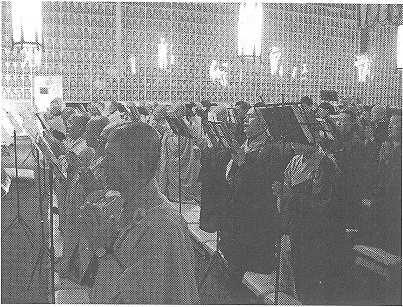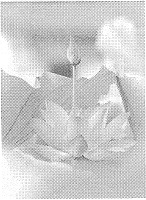|
大眾中有人曾問: 如何鼓勵西方人禮佛?佛教由印度傳到中國的那時候,中國人也不會禮佛的。今日也是同樣情形,我們應該觀照學習如何禮佛,然後我們才能教人如何禮佛。
「法門無量誓願學」: 你如果懂得那無量的法門,就有能力教化無量的眾生。萬佛寶懺是至高無上的法門,我們從這個法會可以學到什麼呢?
什麼是皈依三寶?它最基本的意義是表示改惡向善。首先,我認識到懺悔是在了解自己並非十全十美。人類是一種慣性動物,習慣性地思維、講話和行動。每日生活中,如果沒有抽出時間來懺悔,就永遠無法改善人生的。要懺悔,就必須抽出時間;這如同打籃球時,若沒有中場休息,就會更快筋疲力竭。
其次,我學到迴光反照。懺悔時,我在反省自己;回光照,自己才能懺悔。當我開始參加懺悔法會時,我觀想自己一生所做的一切,也觀想我一生所受的果報來推斷我前世所做的事情。
我越懺悔就越想到我母親所受的苦,然後我就替我母親懺罪。我讀過地藏經後,就學會替別人的母親懺悔;慢慢的我的心量也擴及我父親、叔叔、家貓、家狗等。儘管心胸擴大了,但還未脫離「左親或右鄰」── 那些與我有善緣的眾生。

當我明白更多佛法時,我開始包括一切和我無善緣的眾生,漸及那些無一絲半緣的眾生;最後,我替盡虛空遍法界一切有情無情的眾生及魔鬼懺悔。大眾,我學到懺悔是慈悲平等的一種法門。後來當我為眾生懺悔時,「我」就消失在所懺悔的眾生之一,沒有哪一個眾生除外的。這就是我從未出家到出家後的懺悔心路;其實,出家人因受十方供養,替一切眾生懺悔也是其本份之一。
是否你替眾生懺悔就比只替自己懺悔的人殊勝呢?當然不是,其實,懺悔是用來降伏貢高我慢心的。如果精進禮拜懺悔,卻還是有貢高我慢之心,那麼就還不明白什麼是真懺悔。
所以,每次禮拜你都觀想你在替眾生求懺悔。每天下午四點卅分念誦懺悔文句時,我會改說:「弟子某某替一切眾生,至心懺悔,我等無始以來,所做身口意諸不善行,乃至謗《方等經》,五逆罪等,願皆消滅。」
接下來是偈頌中最重要的部份:「以今禮佛功德因緣,願滿足波羅蜜行,願回向菩提。」請注意:「無上菩提」,為什麼它重要?因為如果修道沒有菩提心,就是邪知邪見。故《華嚴經》云:「忘失菩提心,修諸善法,是名魔業。」換句話說,修行時我們的心要常念菩薩「四弘誓願」之四:「無上菩提誓願成。」「八十八佛懺悔文」中有:「我皆悉迴向,阿耨多羅三藐三菩提。」下午四點卅分我們念懺悔文,文初講懺罪,後講悔改,指出改良生活之途。大師很注重行菩薩道,以積聚功德來彌補以往的過失。
菩薩修六波羅蜜行,為什麼作者選擇「布施」呢 ?懺文內很詳盡的描寫這位菩薩捨棄身體的這一部份和那位菩薩捨棄他身體的那一部份,身體可想到的每一部份都詳述了。它也鼓勵我們做外施。布施治慳貪、自私、和自利,此是造惡業之源。布施是好像於利樂吃虧的行為,反之所以它能修福德,也可以長養其餘五波羅蜜。比如藥王菩薩焚身供養,不但是施捨,也是智慧的表現。豈是諸佛好樂焚焦之軀,佛但讚歎他明白自我空寂之般若智慧。
每當我談到關於萬佛寶懺時,我總是會講我阿姨臨終之言。她說:「在我一生七十五歲中,做過最有意義的事,就是參加了全程的萬佛寶懺。 」所以希望大家都能至少圓滿這剩下的法會。
有個徒弟問他師父:「誰是佛?佛在哪兒?」師父答:「即刻頂禮。」他跟著做。當他站起身時,他突然就開悟了!
問:佛教說:「定業不可轉。那我們是否一定會受不善業的果報呢?」
上人答:「雖說『定業不可轉』,但佛菩薩以『三昧加持力,可滅眾生罪』。但一定要至誠懇切,信心滿足和勇於改過。」 所謂:「恚怒生歡喜,死者變成活。此言若是虛,諸佛不妄說。」
問:「佛菩薩可以承擔眾生的業障嗎?」
答:「佛菩薩有力量替我們赦罪,但要我們願意改過。沒有改過自新的心,懺悔就未圓滿。
|
|
A member of the assembly was concerned as to how to encourage westerners to bow. When Buddhism came to China from India, the Chinese did not know how to bow. The same should be applied today: we should contemplate learning how to bow; only then can we teach others to do so.
“Dharma doors are immeasurable and I vow to learn them.” If you know the immeasurable dharma doors, then you will be able to teach beings on a vast scale. The 10,000 Buddhas Repentance is one such supreme dharma door. So, what do we learn from the repentance ceremony?
What is the meaning of taking refuge with the Triple Jewel? It basically means one wants to change from evil to good, to rectify our lives. First, I learnt that repentance is the act of recognizing that we are not perfect beings. Humans are creatures of habit, who tend to think, speak and act habitually. In our daily lives, if we do not take time out to repent, we would never be able to improve or rectify our lives. Repentance is the act of taking time out. If we play basketball without taking time out we would certainly wear ourselves out much faster.
Secondly, I learned to turn the light inwards. When I repent, I reflect on myself. When I first started to participate in the repentance ceremony, I reflected upon things that I have done in my life, and on the karmic retributions I underwent to understand the things that I may have done in previous lives.
As I did more repentance, I thought about the suffering of my mother. Then I repented for her karma. After reading the
Sutra of the Past Vows of Earth Store Bodhisattva, I learned to repent for other people’s mothers. Then, slowly my mind expanded to include my father, my uncle, my grandparents, my dog, my cat and so on. Though my mind had expanded, it was still “my this and my that” — those with whom I have good affinities.
As I understand more of the teaching, I started to include those with whom I do not have good affinities and it expanded to those with whom I have no affinities at all. Finally I ended by repenting on behalf of living beings, both sentient and insentient, and demons throughout the Dharma Realm and to the ends of empty space.
I learnt that repentance is an act of compassion and an expression of equanimity. In the end when I repent on behalf of living beings, the notion of self disappears and I become just one of the beings whom I repent for and there is no particular face to be singled out. This is the progression of my practice of repentance from being a first time practitioner to being a monk. Actually, it is an obligation of monastics to repent on behalf of living beings because we live on alms from the ten directions.
Does repenting on behalf of living beings mean that your repentance is superior to that of the next person who only repented for himself? Certainly not, in fact,
the act of repentance is to squash the big ego, the thought of condescension. After making numerous prostrations and repentance, if we still have a thought of the superior and arrogant self, then certainly we have not understood what repentance actually is.
In every prostration, you ought to contemplate that you are repenting on behalf of living beings. When the repentance text is recited at 4:30 in the afternoon, I would modify the text to say “I, disciple so and so, repent on behalf of living beings for the karma of body, mouth and mind that we have committed from beginningless time. I have done unwholesome deeds, even going so far as to slandering the Vaipulya Sutras, to commit the five rebellious offenses, and so forth. I vow to extinguish all these offenses.”
What follows is the most important part of the verse: “With the causes and conditions of bowing to the Buddhas and the merit and virtue now derived, I vow to perfect the practice of all paramitas and make transference to unsurpassed Bodhi” Please take note ‘to unsurpassed Bodhi.’ Why is this line important? Without the resolve for Bodhi, any practice in cultivation is deviant. The
Flower Adornment Sutra says, “If you forget your resolve upon Bodhi, your cultivation of even wholesome dharmas becomes the karma of demons.” In other words, while cultivating, one must always remember the fourth vow of a Bodhisattva, “I vow to realize unsurpassed Bodhi.” In the Eighty-eight Buddhas Repentance there is a verse which ends by saying “I transfer to
anuttarasamyaksambodhi.” The text recited at 4:30 in the afternoon starts as a repentance text but is followed by the text on reform, which tells us how to rectify our lives. The Great Master emphasized undertaking Bodhisattva practices to generate blessings and virtue to make up for the mistakes done in the past.
 There are six
paramitas which Bodhisattvas practice. Why did the compiler of the repentance choose to focus on ‘giving’? The text describes how this Bodhisattva gave this part of the body and that Bodhisattva gave that part of the body, covering every conceivable part of the body in great detail. It also urges us to give that which is external to ourselves. Giving cures greed, selfishness and the pursuit of personal advantage, the root causes of the most evil karma. Giving is an act in which one seems to take a loss, but it actually generates blessings and virtue. It will nurture the practice of the remaining five
paramitas. For example, Medicine King Bodhisattva’s act of immolating his body was not only an act of giving but an expression of wisdom. It is not that Buddhas like a burnt body, but the Buddhas praised him for understanding the emptiness of self –
prajna wisdom. There are six
paramitas which Bodhisattvas practice. Why did the compiler of the repentance choose to focus on ‘giving’? The text describes how this Bodhisattva gave this part of the body and that Bodhisattva gave that part of the body, covering every conceivable part of the body in great detail. It also urges us to give that which is external to ourselves. Giving cures greed, selfishness and the pursuit of personal advantage, the root causes of the most evil karma. Giving is an act in which one seems to take a loss, but it actually generates blessings and virtue. It will nurture the practice of the remaining five
paramitas. For example, Medicine King Bodhisattva’s act of immolating his body was not only an act of giving but an expression of wisdom. It is not that Buddhas like a burnt body, but the Buddhas praised him for understanding the emptiness of self –
prajna wisdom.
Whenever I talk about the 10,000 Buddhas Repentance, I always like to share what my auntie said on her deathbed. “The only thing I did of value in my entire 75 years was to participate fully in the 10,000 Buddhas repentance.” May the great assembly at least complete the remainder of this session of the 10,000 Buddhas repentance.
A student once asked his master, “Who is the Buddha? Where is the Buddha?” The Master retorted, “Quickly bow down.” The student did so in response. When he got up, he suddenly became enlightened!
Q: Buddhism says, “Fixed karma means that it can’t be changed. Will we definitely face the corresponding retributions for the unwholesome karma that we’ve committed?
Venerable Master: Even though it is said that fixed karma can’t be changed, offenses can be eradicated through the aid bestowed by the Buddhas and Bodhisattvas in samadhi. However, we must be extremely repentant, sincere, full of faith and courageous enough to change. As the saying goes – “Wrath can turn into happiness; the dead can return to life. If you say these words are false, you should know that Buddhas never lie.”
Q: Can Buddhas and Bodhisattvas shoulder living beings’ karmic obstacles?
A: Buddhas and Bodhisattvas have the power to acquit us for our offenses if we are willing to change. The repentance is not complete if people are unwilling to change.
|